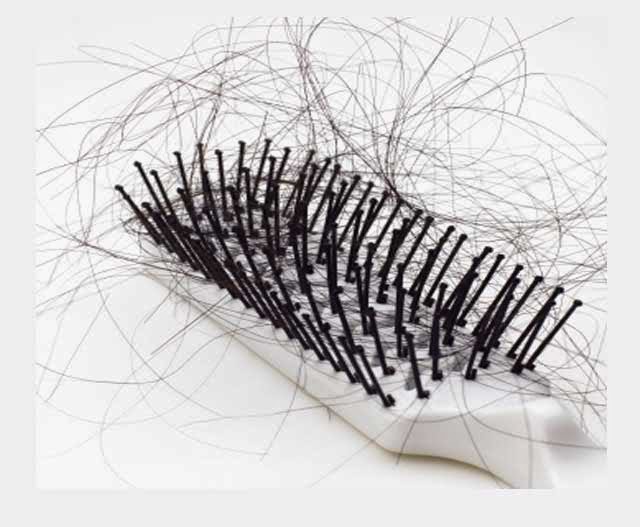Saturday, June 28, 2014
Food for Preventing Hair Loss
Alopecia Areata
What Is Alopecia Areata?
Alopecia areata is considered an autoimmune disease, in which the immune system, which is designed to protect the body from foreign invaders such as viruses and bacteria, mistakenly attacks the hair follicles, the tiny cup-shaped structures from which hairs grow. This can lead to hair loss on the scalp and elsewhere.
In most cases, hair falls out in small, round patches about the size of a quarter. In many cases, the disease does not extend beyond a few bare patches. In some people, hair loss is more extensive. Although uncommon, the disease can progress to cause total loss of hair on the head (referred to as alopecia areata totalis) or complete loss of hair on the head, face, and body (alopecia areata universalis).
Hair Loss Information
In the contemporary times, people are becoming more and more conscious about their looks. And when it comes to looking good, maintaining shiny smooth hair, undoubtedly, becomes of prime importance. It is here where conditions like baldness, thinning of hair and loss of hair become a cause of concern.
Causes
In alopecia areata, immune system cells called white blood cells attack the rapidly growing cells in the hair follicles that make the hair. The affected hair follicles become small and drastically slow down hair production. Fortunately, the stem cells that continually supply the follicle with new cells do not seem to be targeted. So the follicle always has the potential to re grow hair.
Hair loss symptoms:
· Hair fall on clothes after combing
· Gradual appearance of bald patches
· Receding hairline
Causes of baldness:
· Lack of nutrition
· Mental stress and strain
· Prolonged illness like typhoid, chronic cold etc
· Lack of personal hygiene like unclean conditions of scalp
Hair Loss a Symptom of a Serious Disease?
Alopecia areata is not a life-threatening disease. It does not cause any physical pain, and people with the condition are generally healthy otherwise. But for most people, a disease that unpredictably affects their appearance the way alopecia areata does is a serious matter.
The effects of alopecia areata are primarily socially and emotionally disturbing. In alopecia universalis, however, loss of eyelashes and eyebrows and hair in the nose and ears can make the person more vulnerable to dust, germs, and foreign particles entering the eyes, nose, and ears.
Alopecia areata often occurs in people whose family members have other autoimmune diseases, such as diabetes, rheumatoid arthritis, thyroid disease, systemic lupus erythematosus, pernicious anaemia, or Addison's disease. People who have alopecia areata do not usually have other autoimmune diseases, but they do have a higher occurrence of thyroid disease, Atopic eczema, nasal allergies, and asthma.
Hair Ever Grow Back?
There is every chance that your hair will re grow, but it may also fall out again. No one can predict when it might re grow or fall out. The course of the disease varies from person to person. Some people lose just a few patches of hair, then the hair re grows, and the condition never recurs. Other people continue to lose and re grows hair for many years. A few lose all the hair on their head; some lose all the hair on their head, face, and body. Even in those who lose all their hair, the possibility for full re growth remains.
In some, the initial hair re growth is white, with a gradual return of the original hair colour. In most, the re grown hair is ultimately the same colour and texture as the original hair.
Alopecia Areata Treatment
Conventional Drugs
The following are some commonly used medicines for alopecia areata. Keep in mind that while these treatments may promote hair growth, none of them prevent new patches or actually cure the underlying disease.
Corticosteroids, Minoxidil (5%), Anthralin (Psoriatic), Sulfasalazine, Oral cyclosporine
Homoeopathic Treatment
Homoeopathic medicines acts best in Alopecia Areata
For treatment please click the following link
http://treatmentt.blogspot.com/2009/11/alopecia-areata-treatment.html
For Direct Consultation Please visit
Chennai - Head Office
(Consultation by Appointment only)
Vivekanantha Homeo Clinic & Psychological Counseling Center
B-12, Second Floor, Paramount Park (Dr Plaza) - B Block,
Velachery Main Road,
Direct Opposite to Saravana Stores, Mega mart upstairs,
Near Vijaya nagar Bus Stand,Velachery, Chennai 42,
Panruti – Branch Office
Vivekanantha Homoeo clinic & Psychological Counseling Center
126,Chennai Salai
( Near Railway Gate, Lakshmi Villas Bank ATM Direct Opposite)
Panruti 607106
Cuddalore District
Tamilnadu
For Appointment
Please call: 09443054168, 09786901830
Pondicherry Camp
(Consultation by Appointment only)
Every Saturday:11.00am to 04.00pm
NB:-
Ø We are taking only minimum number of patients per day.
Ø We are allotting 40 to 5o minutes for new patients & 15 to 20 minutes for follow-ups.
Ø So be there at time to avoid unwanted waiting
Ø For Psychological consultation “we concentrate more to client’s privacy, so we are allotting 40 to 50 minutes/client – so be there at time”
For Appointment
Please call: 09443054168, 09786901830
For Foreign patients
For more detail and mode of payment
Send mail to consult.ur.dr@gmail.com
Or
Call +91 9443054168, +91 9786901830
http://homeoall.com/
Professional secrecy will be maintained
(Your complaints and other Details should be kept very confidential)
--==--



No comments:
Post a Comment